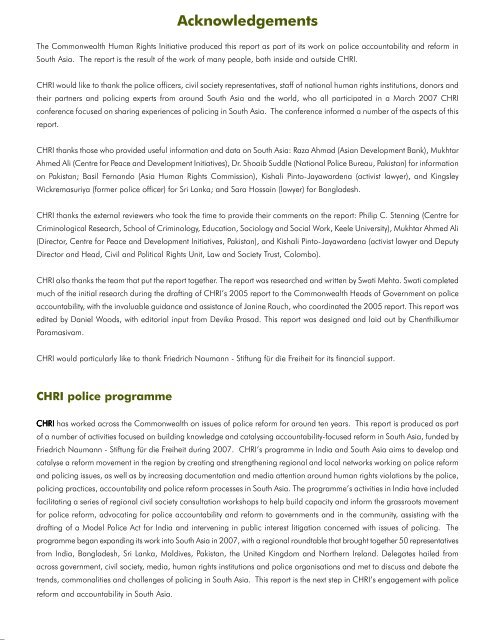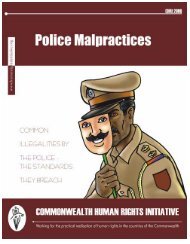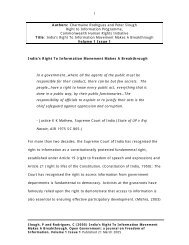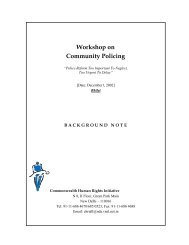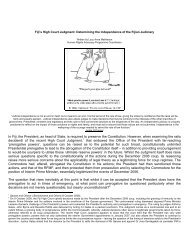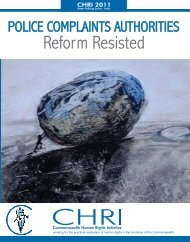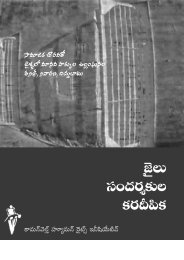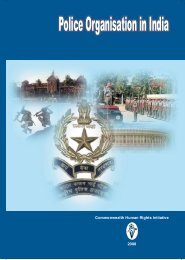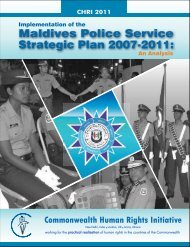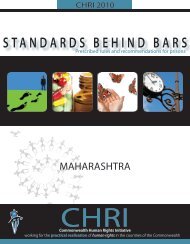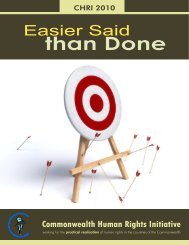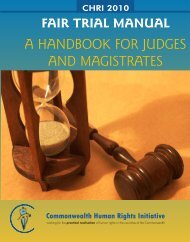Feudal Forces: Democratic Nations - Police Accountability in
Feudal Forces: Democratic Nations - Police Accountability in
Feudal Forces: Democratic Nations - Police Accountability in
You also want an ePaper? Increase the reach of your titles
YUMPU automatically turns print PDFs into web optimized ePapers that Google loves.
FEUDAL FORCES: DEMOCRATIC NATIONSAcknowledgementsThe Commonwealth Human Rights Initiative produced this report as part of its work on police accountability and reform <strong>in</strong>South Asia. The report is the result of the work of many people, both <strong>in</strong>side and outside CHRI.CHRI would like to thank the police officers, civil society representatives, staff of national human rights <strong>in</strong>stitutions, donors andtheir partners and polic<strong>in</strong>g experts from around South Asia and the world, who all participated <strong>in</strong> a March 2007 CHRIconference focused on shar<strong>in</strong>g experiences of polic<strong>in</strong>g <strong>in</strong> South Asia. The conference <strong>in</strong>formed a number of the aspects of thisreport.CHRI thanks those who provided useful <strong>in</strong>formation and data on South Asia: Raza Ahmad (Asian Development Bank), MukhtarAhmed Ali (Centre for Peace and Development Initiatives), Dr. Shoaib Suddle (National <strong>Police</strong> Bureau, Pakistan) for <strong>in</strong>formationon Pakistan; Basil Fernando (Asia Human Rights Commission), Kishali P<strong>in</strong>to-Jayawardena (activist lawyer), and K<strong>in</strong>gsleyWickremasuriya (former police officer) for Sri Lanka; and Sara Hossa<strong>in</strong> (lawyer) for Bangladesh.CHRI thanks the external reviewers who took the time to provide their comments on the report: Philip C. Stenn<strong>in</strong>g (Centre forCrim<strong>in</strong>ological Research, School of Crim<strong>in</strong>ology, Education, Sociology and Social Work, Keele University), Mukhtar Ahmed Ali(Director, Centre for Peace and Development Initiatives, Pakistan), and Kishali P<strong>in</strong>to-Jayawardena (activist lawyer and DeputyDirector and Head, Civil and Political Rights Unit, Law and Society Trust, Colombo).CHRI also thanks the team that put the report together. The report was researched and written by Swati Mehta. Swati completedmuch of the <strong>in</strong>itial research dur<strong>in</strong>g the draft<strong>in</strong>g of CHRI’s 2005 report to the Commonwealth Heads of Government on policeaccountability, with the <strong>in</strong>valuable guidance and assistance of Jan<strong>in</strong>e Rauch, who coord<strong>in</strong>ated the 2005 report. This report wasedited by Daniel Woods, with editorial <strong>in</strong>put from Devika Prasad. This report was designed and laid out by ChenthilkumarParamasivam.CHRI would particularly like to thank Friedrich Naumann - Stiftung für die Freiheit for its f<strong>in</strong>ancial support.CHRI police programmeCHRI has worked across the Commonwealth on issues of police reform for around ten years. This report is produced as partof a number of activities focused on build<strong>in</strong>g knowledge and catalys<strong>in</strong>g accountability-focused reform <strong>in</strong> South Asia, funded byFriedrich Naumann - Stiftung für die Freiheit dur<strong>in</strong>g 2007. CHRI’s programme <strong>in</strong> India and South Asia aims to develop andcatalyse a reform movement <strong>in</strong> the region by creat<strong>in</strong>g and strengthen<strong>in</strong>g regional and local networks work<strong>in</strong>g on police reformand polic<strong>in</strong>g issues, as well as by <strong>in</strong>creas<strong>in</strong>g documentation and media attention around human rights violations by the police,polic<strong>in</strong>g practices, accountability and police reform processes <strong>in</strong> South Asia. The programme’s activities <strong>in</strong> India have <strong>in</strong>cludedfacilitat<strong>in</strong>g a series of regional civil society consultation workshops to help build capacity and <strong>in</strong>form the grassroots movementfor police reform, advocat<strong>in</strong>g for police accountability and reform to governments and <strong>in</strong> the community, assist<strong>in</strong>g with thedraft<strong>in</strong>g of a Model <strong>Police</strong> Act for India and <strong>in</strong>terven<strong>in</strong>g <strong>in</strong> public <strong>in</strong>terest litigation concerned with issues of polic<strong>in</strong>g. Theprogramme began expand<strong>in</strong>g its work <strong>in</strong>to South Asia <strong>in</strong> 2007, with a regional roundtable that brought together 50 representativesfrom India, Bangladesh, Sri Lanka, Maldives, Pakistan, the United K<strong>in</strong>gdom and Northern Ireland. Delegates hailed fromacross government, civil society, media, human rights <strong>in</strong>stitutions and police organisations and met to discuss and debate thetrends, commonalities and challenges of polic<strong>in</strong>g <strong>in</strong> South Asia. This report is the next step <strong>in</strong> CHRI’s engagement with policereform and accountability <strong>in</strong> South Asia.4 :: POLICE ACCOUNTABILITY IN SOUTH ASIA


